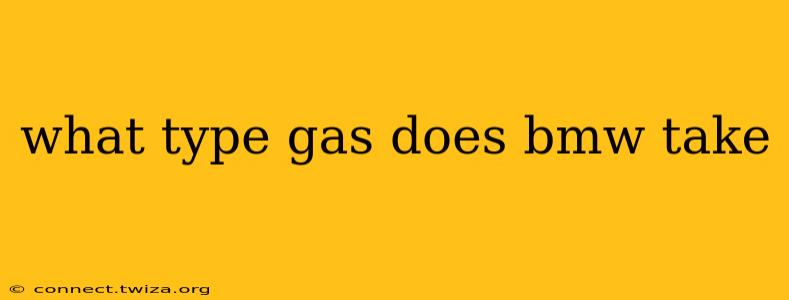BMWs, renowned for their performance and luxury, require the correct fuel to maintain their optimal operation and longevity. The type of gas a BMW takes depends on the specific model and year, but generally, understanding the fuel recommendations is crucial for both performance and engine health. This guide will help clarify the fuel requirements for your BMW and address some common questions.
What octane rating of gas does a BMW need?
This is a crucial question, and the answer isn't a single number. BMWs typically recommend premium unleaded gasoline with a minimum octane rating of 91 (RON) or higher. However, consulting your owner's manual is paramount. The specific octane recommendation will be clearly stated there, and ignoring this advice could lead to engine damage or reduced performance. Some models may be flexible and accept slightly lower octane fuel, but using premium is always recommended for optimal engine performance and longevity. Using lower-octane fuel can lead to knocking or pinging, which is a harmful engine condition.
Can I use regular gas in my BMW?
While some older BMW models might tolerate regular unleaded gasoline in a pinch, it's generally not recommended. Modern BMW engines are engineered for premium fuel, and using regular gas can lead to decreased engine efficiency, reduced power, and potential long-term engine damage. The engine's computer may detect the lower octane and adjust accordingly, potentially affecting performance negatively. Regular gas may also increase the likelihood of engine knock, which over time can cause damage. Therefore, it's always best to stick to the recommended premium fuel.
What is the difference between premium and regular gas?
The main difference lies in the octane rating. Octane refers to the fuel's resistance to knocking or pinging during combustion. Premium gas has a higher octane rating, meaning it's less prone to pre-ignition (knocking) under high compression. BMW engines, particularly those with high-performance capabilities, often employ higher compression ratios, necessitating the use of higher-octane premium fuel to prevent knocking and maintain optimal performance.
Does using the wrong gas damage my BMW engine?
Using lower-octane fuel than recommended can damage your BMW engine, although the impact may not be immediately noticeable. Consistent use of lower-octane fuel can lead to:
- Reduced engine performance: You might notice a loss of power and acceleration.
- Engine knocking or pinging: This harsh sound signifies pre-ignition and is a sign of engine stress.
- Increased fuel consumption: Lower octane fuel may not burn as efficiently.
- Long-term engine damage: Persistent use of incorrect fuel can cause significant and costly damage over time.
Can I use E85 fuel in my BMW?
No, BMWs are not designed to run on E85 (a blend of 85% ethanol and 15% gasoline). Using E85 in a BMW engine not specifically designed for it will likely lead to significant engine damage and void any warranty. Always use the fuel specified in your owner's manual.
In conclusion, always refer to your BMW owner's manual for the specific fuel recommendations for your model. Using the correct fuel is crucial for maintaining optimal engine performance, longevity, and avoiding costly repairs. Don't compromise on fuel quality; your BMW deserves the best.
